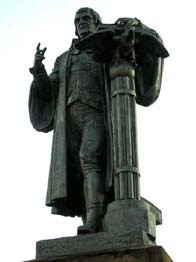Today in History: John Witherspoon, Parson and Patriot

"There is not a single instance in history in which civil liberty was lost, and religious liberty preserved entire.” So warned Presbyterian minister John Witherspoon, who on June 22, 1776, was elected to represent New Jersey in the Continental Congress in Philadelphia.
Witherspoon had emigrated from Scotland to take the post as president of the College of New Jersey (now Princeton University). Arriving in 1768 with his family and three hundred books for the college library, he threw himself into the task of building up the young school. “He laid the foundation of a course of history in the college, and the principles of taste an the rules of good writing were both happily explained by him, and exemplified in his manner,” a colleague said.
As the Revolution approached, Witherspoon’s Presbyterian belief that people should choose their own government put him firmly on the Patriot side. He realized the colonies would have to fight Britain. “If your cause is just, if your principles are pure, and if your conduct is prudent, you need not fear the multitude of opposing hosts,” he preached.
In the Continental Congress, some delegates worried the country was not yet ripe for independence. “The country is not only ripe for the measure, but in danger of rotting for the want if it!” Witherspoon retorted. He became the only minister to sign the Declaration of Independence.
He lost a son in the Revolution, which also left the college in dire straits. After the war he tackled the job of rebuilding the school. “Do not live useless and die contemptible,” he exhorted his students, who included 9 future cabinet officers, 21 senators, 39 congressmen, 3 Supreme Court justices, 12 governors, a vice president, and a president--James Madison, who was also one of 5 Witherspoon students at the Constitutional Convention.
American History Parade
1793 - One of the nation’s first important canals, the Middlesex Canal, connecting the Merrimack River and the port of Boston, is chartered.
1944 - President Franklin D. Roosevelt signs the G.I. Bill of Rights, offering educational opportunities for World War II vets.
1945 - The Battle of Okinawa ends with an Allied victory.
1970 - President Richard Nixon signs a bill lowering the voting age to 18.
The American Patriot's Almanac: Daily Readings on America
Labels: History




0 Comments:
Post a Comment
<< Home